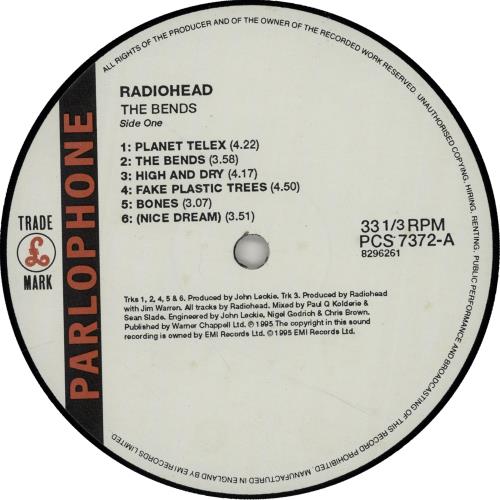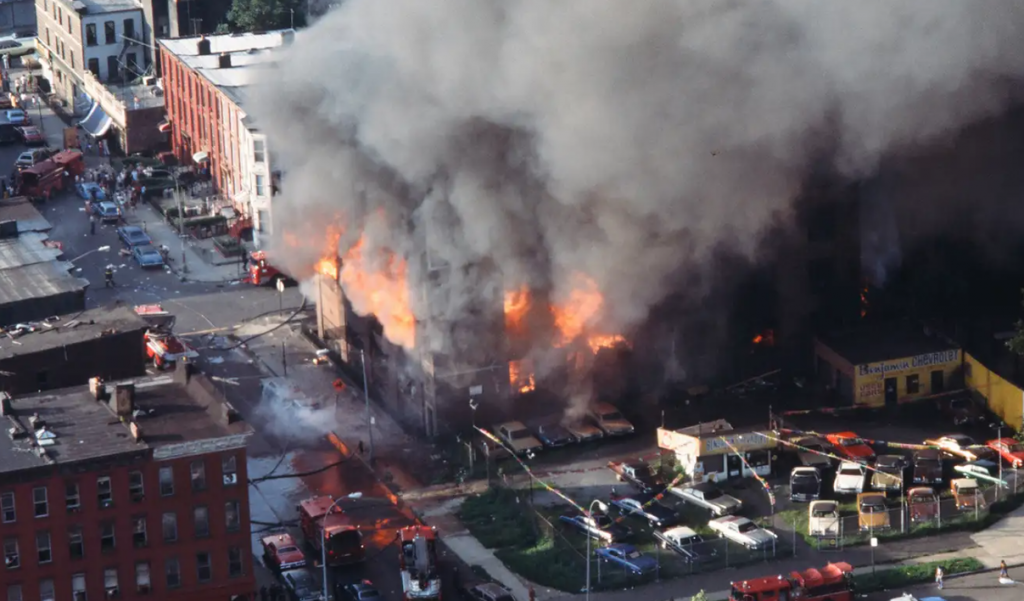In a piece that focuses on music I felt this song was appropriate to listen to while reading. Fake Plastic Trees played on loop in my head as I read his book. A call against consumerism and the capitalist regime, it perfectly summarises the dangers of falling for fake plastic love.
Cunningham and Warrick talk about Crisis Theory in their work Unnoticed Apocalypse, and this is the type of apocalypse dealt with in the ‘before’ parts of Infinite Detail. There is this great schism, the before and after, all triggered by the destruction of the internet. In a world that was so dependant on the internet and that was so full of surveillance capitol, once that was gone society completely crumbles. In Bristol there is a complete collapse. This is reminiscent of what Benjamin (1999) suggests in his notes making up the Arcades Project:
The concept of progress must be grounded in the idea of catastrophe. That things “just keep going” [are “status quo”]is the catastrophe …. Thus Strindberg (in “To Damascus”): hell is not something that awaits [or lies ahead of] us, but is life here and now
benjamin (473)

Benjamin is suggesting that our progress as a society is leading us for an immanent apocalypse, that our catastrophe is coming from our own success. This work is echoing the previous work of Frank Kermode. Kermode alludes to the bible are recalls an idea that first appears in the Book of Revelation, the ‘reign of Beast’ that takes place between time and the End. He writes;
‘Transition is the historical ancestor of modern crisis; in so far as we claim to live now in a period of perpetual transition we have merely elevated the interstitial period into an age or saeculum in its own right, and the age of perpetual transition in technological and artistic matters is understandably an age of perpetual crisis in morals and politics.’ (Kermode 1966, 28)
Merlyn Oliver Evans
The Mark of the Beast
1940
Maughan’s Bristol, the Before, creates this world that is within this ‘reign of Beast’ in a state of constant ‘perpetual transition’ a world devoid of true human connection that is ever changing depending on technological upgrades. A world of predictive policing, surveillance capitalism, control and above all, a dependency on the ersatz good of the internet This is shown best in the last part of the before when Rush is locked away in a New Jersey data centre, finding himself trapped around “server racks, strobing with green and amber lights […] all wired together in some crazy-ass way, the box full of suspended cables, crisscrossing through the air from wall to wall, rack to rack, like a three-dimensional spiderweb.” He’s trawling his way through the entanglement of spider’s webs that is the internet, looking for any last memories of his partner Scott before it all went dark. Memory and love are lost to the hardware of the internet, their relationship wasn’t real but grounded in the falseness of the online world, reminiscent of;
A green plastic watering can
For a fake Chinse rubber plant
In a fake plastic earth
That she bough from a rubber man
In a town full of rubber plants
To get rid of itself
fake plastic trees
In the After, Vinyl records, 3.5-inch floppies, VHS tapes, and DVDs are some of the most closely guarded objects in Infinite Detail. Within Cabot Circus, Bristol’s expansive shopping centre, most stores have already been looted, except for a single shop that houses “antique LCD televisions” and tapes. A sign in this shop warns that thieves will face dire consequences if theft is attempted, “thieves will be shot.” The tapes that Tyrone manages to acquire are not only valuable but also instrumental in remembering what society once was “[d]ecades of history, long lost elsewhere”, representing decades of history that have been lost elsewhere. Safeguarding this music becomes an ethical obligation. Tyrone unintentionally becomes an archivist. Through this portrayal, Maughan illustrates that the act of preserving memories requires active attention and care. Our digital culture is far more fragile than we can comprehend. These very things that society now has disregarded are the very objects that Maughan believes will be crucial in the rebuilding of a fallen society, built up from lost relics of the past.


The premise of the novel can be seen as a macrocosm for an event that took place in America in the 1970s. The New York blackout of 1977 was an event that spanned several legends in the music industry, there is a suggestion and stories that it offered a convenient opportunity for aspiring hip-hop artists to illegally acquire the expensive equipment necessary for their musical development, which they otherwise could not afford. This event, in turn, acted as a catalyst for the emergence and proliferation of a fresh sound and culture. While this tale cannot be proven or disproven, it holds value as a narrative that explores the interplay between technology, culture, social class, race, and the potential to construct a brighter future from the remnants of the past. Infinite Detail masterfully explores this concept on a larger, more expansive level. This real-life event shows the power of the human spirit and how intertwined that spirit is with music and culture, and how from the disaster in 1977 something new was created. The same thing has the potential to happen at the end of Maughan’s text, however there is no admission to what would happen next, one of the texts biggest flaws, but it gives society hope that they can take this plastic, things seen as gimmicks now, and build a future with them.
Robert R. McElroy/Getty Images
She looks like the real thing
She tastes like the real thing
But I can’t help the feeling
I could blow through the ceiling
If I just turn and run
fake plastic trees
Bibliography
Man text
Maughan, Tim. Infinite Detail. First edition. New York, Farrar, Straus and Giroux, 2019.
Secondary Texts
Benjamin, W. 1999. The Arcades Project. Translated by H. Eiland and K. McLaughlin. Cambridge, MA: Harvard University Press.
Cunningham, David, and Alexandra Warwick. “Unnoticed apocalypse: The science fiction politics of urban crisis.” City 17.4 (2013): 433-448.
Kermode, F. 1966. The Sense of an Ending. Oxford: Oxford University Press.
Word count – 967
I found your focus on music to be a great frame to look at Maughan’s novel. Walter Benjamin’s idea that progress can be the catastrophe itself creates a very interesting connection between trends in contemporary literature represented by Infinite Detail and trends in inter-war literary and cultural expression. We sometimes forget that anxiety about society’s reliance on industrial technology has a long history in literature and culture going back to the Romantics. Instead of viewing contemporary novels like Infinite Detail as representing a new rupture caused by the ever increasing development of technology and its encroachment on our social and cultural lives we can view it as a new iteration of an anxiety that has been at the forefront of literature since the start of the 19th century. The connection to New York blackouts in 1977 is also fascinating. I’m thinking specifically about how in modern literature and culture there are a great many explosions of expression that can be traced to negative developments rather than positive ones, like how Modernism’s reaction to the carnage of WWI gave us poems like The Waste Land.
Thank you Matthew! Great point about The Waste Lands, now that you mention it
Unreal City,
Under the brown fog of a winter dawn,
A crowd flowed over London Bridge, so many,
I had not thought death had undone so many.
Sighs, short and infrequent, were exhaled,
And each man fixed his eyes before his feet.
Suits the themes that Maughan looks at incredibly fittingly.